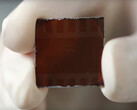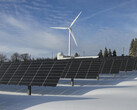British chemicals specialist Leverton and German energy supplier EnBW have repurposed the geothermal power plant in Bruchsal, Germany. Steam is usually generated there using deep water at 120 °C (250 °F) to drive turbines to generate electricity. Hot water generation is also the main focus here.
The water from the earth's upper crust also contains lots of minerals. Although the brine found in many places on earth consists mainly of water and common salt, the proportion of lithium is not negligible.
LevertonHELM, a specialist in processing and refining precisely this sought-after metal, has processed the rich solution at its plant in Basingstoke in the UK. The result is a lithium carbonate of almost perfect purity.
With a 99.5 percent content, it can be used directly for battery production. The next step is to drive forward the collaboration between the two companies. The goal is the sustainable production of lithium in significant quantities.
Instead of digging the mineral out of mines and laboriously separating it from other materials, separating it from deep saline water is actually an elegant way of doing this. And it would be a promising way for Europe to make effective use of its own raw material deposits.
It is estimated that there are currently 80 million tons of lithium in dissolved form in the earth's crust. In view of annual production of just over 100,000 tons, the prospects of being able to extract sufficient quantities of the coveted substance are not bad at all.


















